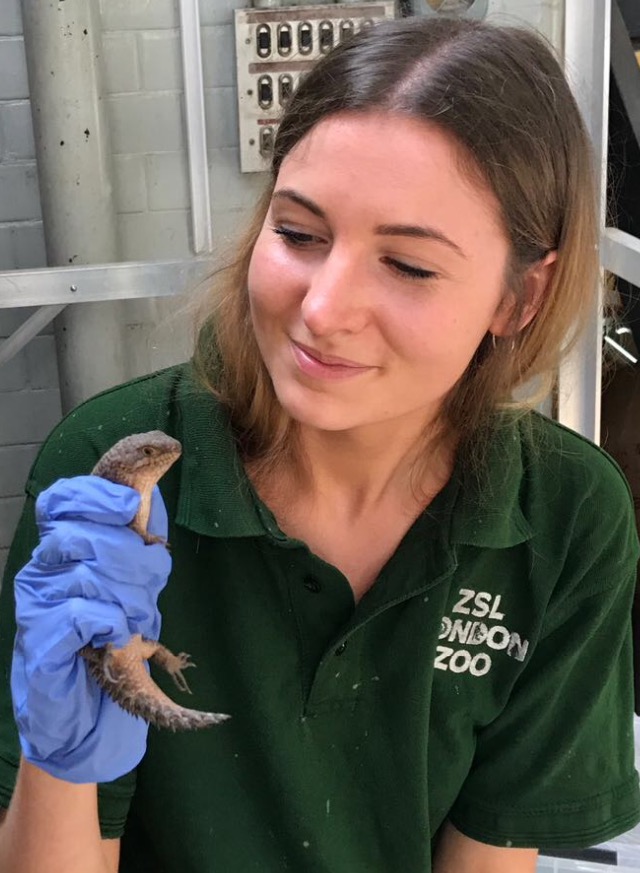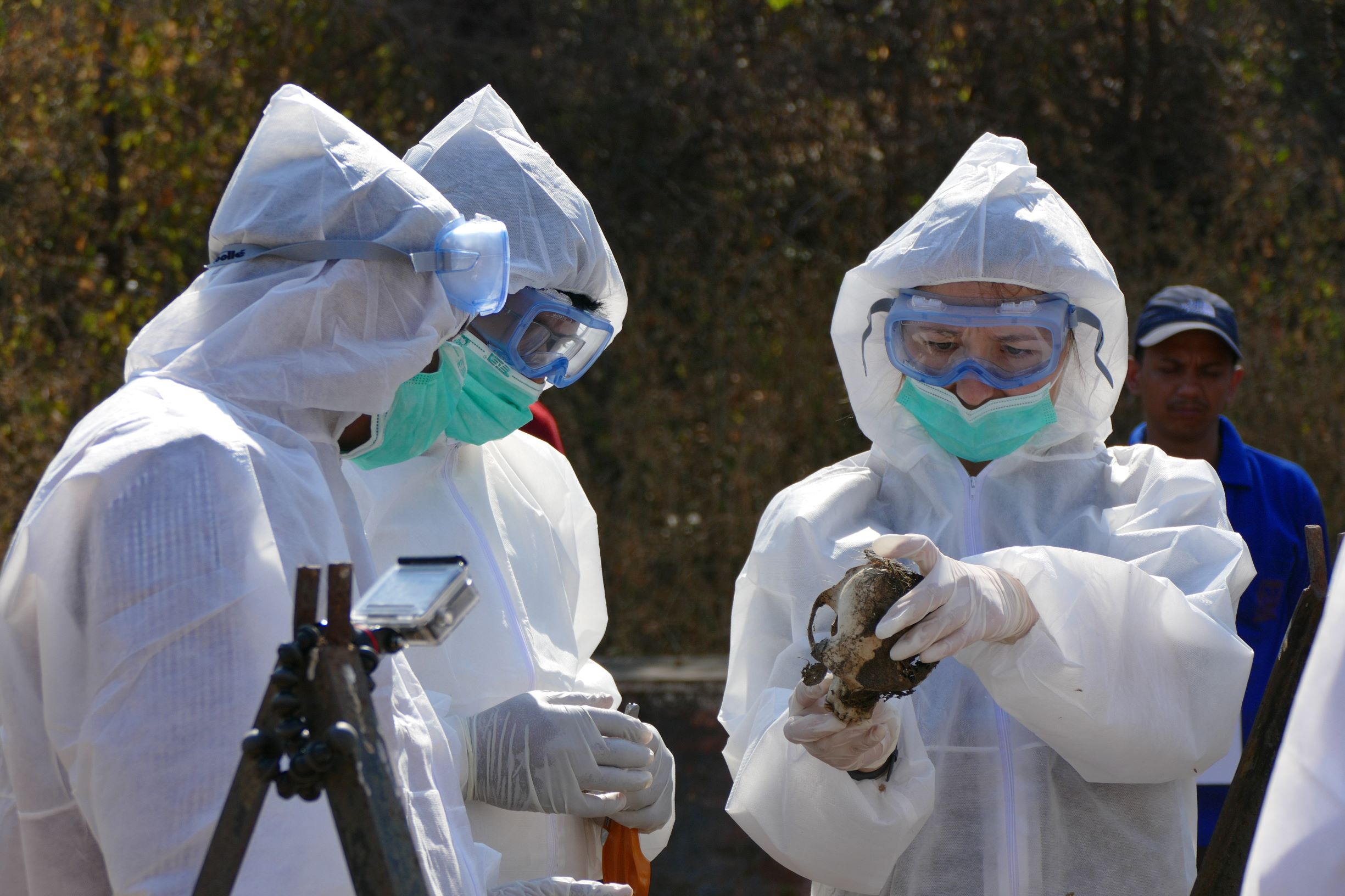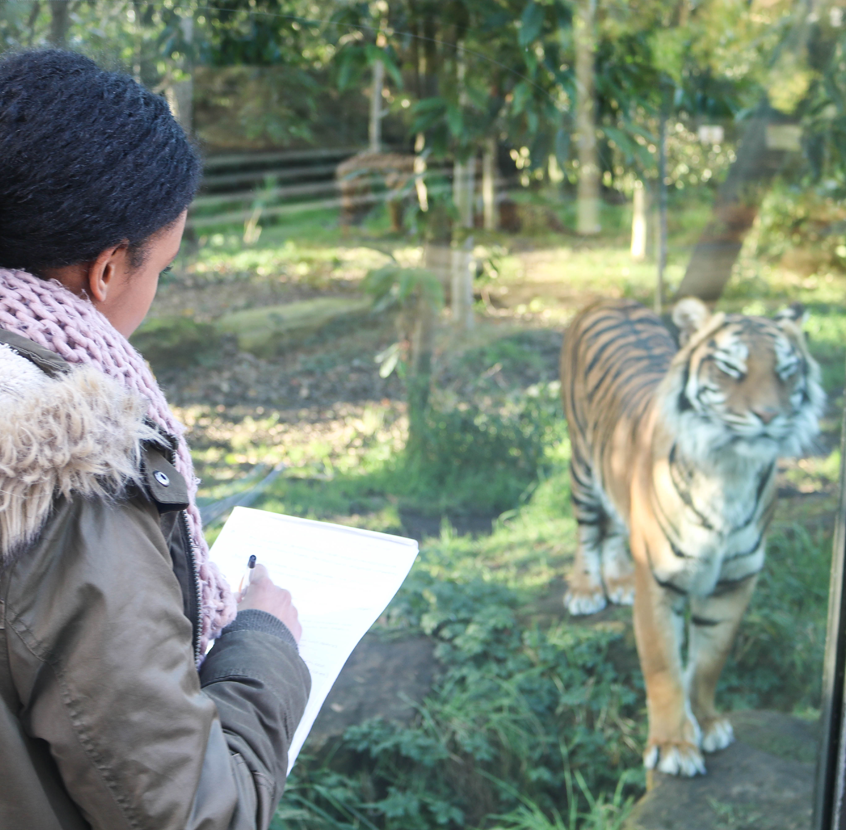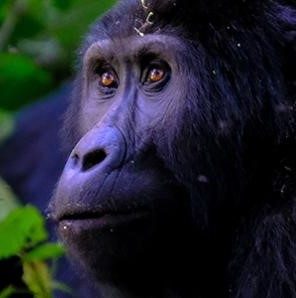The Wildlife Health Bridge is a collaborative project between the Zoological Society of London, the Royal Veterinary College, the Wildlife Institute of India, the University of Edinburgh, the University of Melbourne, Toronto Zoo, the Kenya Wildlife Service and the Wildlife Research & Training Institute. It was initiated in 2009 to improve the education of wildlife health professionals, providing particular support for those in biodiverse, low-resource settings.
Our vision is to achieve global capacity in highly trained wildlife health professionals in a synergised network.
Objectives
The overall objective of this initiative is to improve the expertise and knowledge of wildlife health professionals in biodiverse low- and middle-income countries, by working collaboratively in an integrative approach to education which uses the strengths and knowledge networks of the different partners, and specifically to:
- Provide high quality education in wildlife health, ecosystem health and wildlife biology particularly to students from biodiverse countries, locally relevant to the practice of wildlife health in low resource settings.
- Facilitate interchange of students between collaborating countries for research studies in wildlife health.
- Provide a global graduate network of wildlife health professional alumni for the purpose of (i) enabling networking by wildlife health professionals (ii) facilitating contact and information exchange between the Bridge institutions and graduates.
Through these measures we can make a real difference to the health of free-living wild animals and thus natural ecosystems.
Postgraduate Courses
The Wildlife Health Bridge offers five different postgraduate courses, catered to both veterinarians and biologists. You can find out more about the courses the Wildlife Health Bridge offers below, please follow the links to find out more details about eligibility, fees and application processes.
Upon graduation from one of the below courses, students are invited to become part of an international knowledge exchange network of wildlife professionals referred to as the Wild Animal Alumni (WAA).
There are currently over 600 wildlife professionals from over 60 countries within our network representing a dynamic mix of wild animal managers, field, zoo and rehabilitation veterinarians, academics, legislation and policy advisors, in-situ and ex-situ conservationists, zoological keepers and curators and wild animal pathologists, and many other roles in the world of wild animal health.
Within WAA we encourage collaboration and discussions to better everybody’s knowledge and ability to work towards improving wild animal health practices and research worldwide.
This world-class specialist Masters course has produced over 274 graduates, originating from 55 countries, since its inception in 1994. It provides qualified veterinarians with a critical understanding of the management of wild animals and the epidemiology, treatment and control of wildlife disease.
Over the past 40 years, interventions for health, welfare, and the conservation of free-living wild animals have been undertaken with increasing frequency. Specialist veterinary expertise is required to assess and control diseases in wildlife.
Emerging infectious diseases are also recognised as a serious hazard, both for wild animals and for the domestic animal and human populations that interact with them. In addition, a large number of wild animal species are kept in captivity – in zoos and in laboratories – which has led to an increased demand for specialist skills and knowledge.
The Masters in Wild Animal Health is taught jointly by the Royal Veterinary College and the Zoological Society of London. Aimed at qualified veterinarians, the course will equip you with an in-depth knowledge of the management of wild animals and epidemiology, treatment and control of diseases.
It is completed over one-year full-time study, commencing in the Autumn. The bulk of teaching takes place at The Zoological Society of London, Regents Park, with time also spent at Whipsnade Zoo and Royal Veterinary College, Camden and Hawkshead Campuses. Both Certificate and Diploma levels of study are available.
To find out more about the course click on the image to the left or follow this link https://www.zsl.org/science/postgraduate-study/msc-in-wild-animal-health
Wild animal health has become increasingly popular among non-veterinarians with an undergraduate degree in zoology and biology. Recognising this, the Zoological Society of London, together with the Royal Veterinary College, has developed a unique course aimed at non-veterinary biological science graduates and leading to the MSc in Wild Animal Biology.
The course will provide you with practical exposure to wild animal species and an understanding of their health and welfare, as well as provide training in research methods relevant to the study of wildlife. You will benefit from working and studying alongside veterinary graduates taking the MSc in Wild Animal Health as well as learning from internationally renowned experts in their field.
This specialist Masters course is completed over one-year full-time study, commencing in the Autumn. The bulk of teaching takes place at The Zoological Society of London, Regents Park, with time also spent at Whipsnade Zoo and Royal Veterinary College, Camden and Hawkshead Campuses. Both Certificate and Diploma levels of study are available.
The course is delivered through two terms of lectures, seminars, tutorials and problem-based learning, with modular examinations, followed by a research project over the summer months (May-August), prior to final assessment. Teaching covers taxa e.g. mammals, reptiles, birds and the disciplines that influence these taxa, such as epidemiology, infectious diseases, conservation and management
This course has now been replaced with the BSc/MSci in Wild Animal Health, find out more here https://www.rvc.ac.uk/study/undergraduate/msci-wildlife-health-sciences#tab-overview
The Zoological Society of London (ZSL), The Wildlife Institute of India (WII), The Royal Veterinary College, The University of Edinburgh (UoE), The University of Melbourne (UoM), Toronto Zoo, Kenya Wildlife Service and Wildlife Research Training Institute, have been motivated to run this field course in recognition of the need to conserve globally important biodiversity in South Asia and other biodiverse areas, which can also be hotspots for wildlife diseases and conflict. There is an important need for a greater number of wildlife health professionals with expertise in tackling these relatively unstudied and unchecked wildlife diseases, undertaking interventions in the health, welfare and conservation of wild animals, to investigate emerging infectious diseases and to ensure human well-being.
During this 2.5-week long field course, hosted in highly biodiverse nations including Rajasthan, India and Naivasha, Kenya, participants will carry out a variety of practical and theoretical work, where they are given as many chances as possible to have a hands-on learning experience.
To find out more about this course click on the image on the left or follow this link https://iwah.org/
The MSci in Wild Animal Biology is an undergraduate integrated master’s degree, the aim of which is to give you a thorough foundation in biosciences, with further specialisation into wild animal biology in the fourth year (Masters) of study. This degree is delivered collaboratively between Royal Veterinary College and the Zoological Society of London.
In the first year, you will learn about normal animal physiology including all major body systems and biological processes. In the second year, you will explore disease processes, pathogen biology and an introduction to wild animal biology, as well as carrying out a short wild animal biology focused research project.
In the third year, you will be able to choose the future direction of your course by following a programme of advanced study chosen from a range of optional modules. You will also carry out a longer wild animal biology research project, supervised by a member of academic staff, during which you will continue to develop your practical, analytical and reasoning skills as well as communication, teamwork and professional development skills.
In the fourth year, you will gain practical exposure to wild animal species and an understanding of their health and welfare as well as receiving training in research methodologies relevant to the study of wildlife. The research projects in your second, third and fourth years are all relevant to wild animal biology and this focus aims to make sure that you are ‘work ready’ for a career in a wild animal biology setting, either in an academic role or in industry.
To find out more about this course click on the image on the right or follow this link https://www.rvc.ac.uk/study/postgraduate/wild-animal-biology
This programme provides veterinarians with the skills, knowledge and global networks required to be effective practitioners of Conservation Medicine.
Suitable applicants will be qualified veterinarians with an interest in conservation, wildlife health and ecological health. It is suitable for veterinarians without any wildlife experience as well as those already working in conservation. Participants will gain enhanced career opportunities in academia, non-governmental organisations, government veterinary positions and captive or free-ranging wildlife conservation projects.
This is an online programme and the flexible and part-time format allows participants to achieve a world-class award while maintaining busy professional and personal commitments. The teaching provides a blend of theoretical and practical education to provide the foundation for a career in conservation. A variety of innovative techniques and approaches to teaching are used including online lectures, case studies, discussion forums and personal or group activities. Participants will have a unique opportunity to learn from internationally recognised specialists, both within the University of Edinburgh and from local and international organisations.
To find out more about this course click on the image on the left or follow this link https://www.ed.ac.uk/vet/studying/postgraduate/taught-programmes/conservation-medicine






